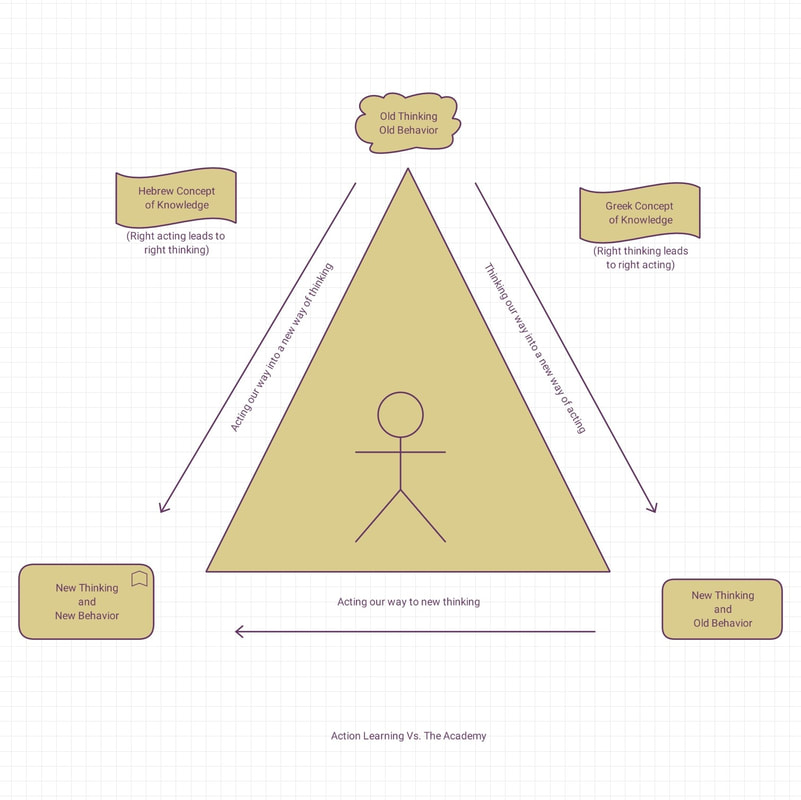|
0 Comments
Subject: This article will help you understand how to have a deeper relationship with God, according to Romans 12:1-2.
Remember the Magic Eye Illustrations of the 1990's? Remember how the discordant patterns and vibrant colors overlaid a single picture that was intended to be seen? The entire point of these visual illusions was to see the picture within the pattern. "If you looked at them in just the right way," you would be able to see the intended picture. It can be the same same way with the Bible. Sometimes, we can get distracted with the inherent beauty of a particular passage, and/or interpret a Scripture according to our own understanding or presuppositions. It seems to me Scripture can (sometimes) be like the Magic Eye Illustrations. We have an idea as to what the surface patterns are, and yet sometimes we have difficulty seeing the pictures composed inside the patterns. Sometimes this can be a difficulty of Scripture. More often than not, Scripture can be pretty straight forward – more or less direct and clear. Yet in certain instances with certain topics – with certain Texts - it can be difficult to ascertain the full picture. We can see the patterns on the surface. We can see the beautiful colors of inspiration, and the divine brushstrokes of grace. However, there are times where we miss the intended picture because we approach the Word through a postmodern worldview (lens). We read into the Text our own cultural, doctrinal, and/or philosophical presuppositions. Like with the Magic Eye Illustrations, there are some Passages that must be “looked at the right way.” We must diligently apply the rules of hermeneutics to our study of God’s word, in order to see the big picture. I submit, this is the case with our Romans 12:1-2 Passage. After a little bit of study, I have concluded that I have had the wrong understanding of this Text. Up until now, I have only seen the beautiful patterns presented in it, but I have missed the picture that was intended to be seen the whole time. I believe God has a word for us, today, that will not only challenge how we understand this Scripture, but it will grant us a clearer vision of what a it means to have a deep spiritual life and a deep relationship with our Lord, Jesus Christ.
|
|
"spiritual worship" - This can also be rendered "reasonable service." It seems obvious that Paul seeks to conjure to mind the priestly service performed at the temple. The concept which leaves "worship" and "service" synonymously linked is that of the priestly duties which worships God through serving others. |
|
"And" -
In the Greek, the grammar between verses 1 and 2 should be noted. The Greek concludes that both of these verses are inextricably connected. "Verse 2, while grammatically parallel to Verse 1, really explains in more detail how this giving of ourselves as sacrifices is to be understood" (Douglas J. Moo; IVP).
In the Greek, the grammar between verses 1 and 2 should be noted. The Greek concludes that both of these verses are inextricably connected. "Verse 2, while grammatically parallel to Verse 1, really explains in more detail how this giving of ourselves as sacrifices is to be understood" (Douglas J. Moo; IVP).
"do not be conformed" -
This is an interesting word. This word is made up of σύν (which means "beside, with, or accompany") and σχῆμα. The word σχῆμα refers to "the habitus, as comprising everything in a person which strikes the senses, the figure, bearing, discourse, actions, manner of life etc." (Blue Letter Bible). Being that the mind is mentioned a little later, we may be tempted to understand this as singularly referring to the mind, intellect, or thought life. This word, however, must be understood as being connected to the whole way of life. This is helpful to understand this in conjunction with the presentations of our bodies to the Lord – not only the presentation of our minds. This command is that of making every effort to keep from falling into the world's systems and patterns of living. While the world would take and take and take, the Believer is to give selflessly of his whole-self. We are not to present our bodies to corrupt worldly pleasures...
This is an interesting word. This word is made up of σύν (which means "beside, with, or accompany") and σχῆμα. The word σχῆμα refers to "the habitus, as comprising everything in a person which strikes the senses, the figure, bearing, discourse, actions, manner of life etc." (Blue Letter Bible). Being that the mind is mentioned a little later, we may be tempted to understand this as singularly referring to the mind, intellect, or thought life. This word, however, must be understood as being connected to the whole way of life. This is helpful to understand this in conjunction with the presentations of our bodies to the Lord – not only the presentation of our minds. This command is that of making every effort to keep from falling into the world's systems and patterns of living. While the world would take and take and take, the Believer is to give selflessly of his whole-self. We are not to present our bodies to corrupt worldly pleasures...
"be transformed" -
Again, this word transformed (μεταμορφόω - metamorphoō) is connected to the offering of our bodies – our entire lives – to God. This can be best understood along the lines of sanctification. As we serve God by serving others and pattern our lives after faithful and sincere obedience, we will find ourselves more and more transformed/sanctified. We must fashion not only our thoughts but our actions in loving obedience to Christ. He did, after all, bestow many mercies upon us. Mercy upon mercy, He justified us and made us righteous before him. We can now understand that we are clean, guiltless, and without spot or blemish. We may now live according to His many mercies and be continuously transformed.
- “Only let us hold true to what we have attained” (Phil. 3:16).
"renewal of your minds" -
Yet again, the concept of “renewing the mind” is juxtaposed to presenting our bodies as a living sacrifice to God. Culturally speaking, it is important to know that a Jew would have understood spiritual transformation and the renewal of the mind differently than we. According to Allen Hirsch, a Jew would have understood that transformation of mind would not only include knowing information, it would have also included action (Allen Hirsch; “Forgotten Ways”). In other words, transformation of the mind would have never have been separated from practice. (See Diagram Below).
And so, in true fashion, Paul would have had in mind that as one views, learns of, and experiences the many mercies of God, it would lead to transformation as the individual demonstrates this knowledge through a change in behavior, action, and practice. The renewal of the mind, to a Jew, would have been inextricable from action/practice.
“That by” -
other translations render this “So that.” This communicates a result. “That by/So that” shows what the result of presenting your body before God, in serving others, begets.
“may discern what is the will of God...” -
The result of fashioning one's life – thinking, behaviors, speech, and selfless service to others – is the discerning of God’s will. This is incredible! As we sacrificially give of ourselves for the benefit of others, we position ourselves to hear from God and discern His will. As we view glory, love, and mercy of God, and begin to participate with the Holy Spirit in our progressive transformation through serving the needs of others, the ongoing result is that of spontaneous revelations of God’s will for us.
The Big Picture!
Simply put, the believer can position themselves to experience a deeper spiritual life with Christ through service.
Firstly, as the believer engages in expressions of worship that seek to glorify God through serving others, these acts of sacrificial service help to keep the individual from being conformed to the patterns of this world. Service is a powerful way to battle the selfishness of the flesh and combat the enticing luster of the world.
Also, from a place joy – having experienced the mercies of God – the believer is able to participate/cooperate with the Holy Spirit in the process of transformation and sanctification.
“I am speaking in human terms, because of your natural limitations. For just as you once presented your members as slaves to impurity and to lawlessness leading to more lawlessness, so now present your members as slaves to righteousness leading to sanctification” (Rom. 6:19).
Like in our Passage, this one also speaks to the fact that we get to participate/cooperate with the Holy Spirit in the process of sanctification. As we make the conscious efforts to present our members (everything we DO in the body) to God, we hike the trail of sanctification. (Also, reference 1 Th. 4: 3 and 1 Peter 1:2).
Secondly, as we worship and glorify God by serving others, we find greater fulfillment and satisfaction in operating under our divinely intended purpose.
Our Romans 12 Passage is riddled with the reality of our new identity and with our priestly calling. We are to understand that, the moment we placed our faith in Jesus Christ, we have been ushered into the “priesthood of believers.” Like it was in under the Old Covenant, we are also to consider our worship and our purpose the same! We are to serve and worship God by serving the needs of the people. As we continuously learn to submit ourselves to the work of Christ through service, we experience the peace and joy of knowing we are operating under what God would ultimately desire of His children.
“But you are a chosen race, a royal priesthood, a holy nation, a people for his own possession, that you may proclaim the excellencies of him who called you out of darkness into his marvelous light” (1 Peter 2:9).
Finally, not only is sacrificial service one of the ways that we get to participate in the many blessings and glories given to those of faith, but is holds a promise of hearing from God. If our desire is for a clearer vision and greater insight into the will of God for us, we will position ourselves – through service – to discern the will of God! The result of sincere and sacrificial service is that of receiving spontaneous revelations of God's will.
Dusty Dahlin
Married with two boys, Dusty is dedicated to his family, the Church were he pastors, and the life-long pursuit of knowing God more fully. There is nothing Dusty loves more than serving God by helping others understand the treasures of Scripture.
Archives
September 2023
March 2022
December 2021
February 2021
December 2020
October 2020
January 2020
December 2019
November 2019
August 2019
July 2019
June 2019
May 2019





 RSS Feed
RSS Feed
